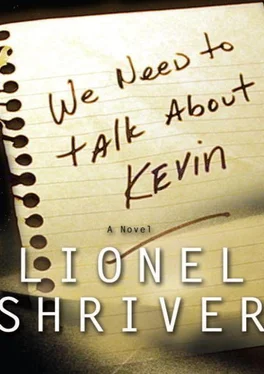It’s possible that she was too much of a girl-girl for you, and her feminine diffidence and delicacy were foreign to me as well. You might have preferred a boisterous, fearless tomboy who made you proud by conquering the summits of jungle gyms, arm-wrestling boys, and declaring to visitors that she planned to be an astronaut—a rough-and-tumble hellion who sauntered about the house in cowboy chaps covered in motor oil. I might have enjoyed that kind of girl, too, but that was not the daughter we got.
Instead, Celia loved to don lacy frocks and dab on the lipstick I rarely wore. But her girlishness wasn’t limited to captivation with jewelry on my dresser, to wobbles in my high-heeled shoes. It expressed itself in a larger weakness, dependency, and trust. She had so many lovely qualities, but she didn’t have guts. She was full of terrors, and not only of the dark, but of the vacuum cleaner, the basement, and the drain. Eager to please, she began to use the potty well before the age of two but into kindergarten was still mortified by venturing into the bathroom by herself. She watched me open and throw out a moldy Columbo container once and for weeks thereafter would not come near the refrigerator, nor touch any substance, like vanilla pudding or even white poster paint, that resembled yogurt. Like many children, she was supersensitive to texture; though tolerant of mud, she reviled what she called “drydirt,” pronounced as one word: fine silty soil, dust on linoleum, even plain flour. The first time I taught her to roll a pie crust, she stood stricken in the middle of the kitchen with her floured hands held out from her side, fingers spread, eyes popped wide. Celia always expressed horror in silence.
As for food, it took me a while to discern what turned out to be fierce aversions. Loath to seem choosy, she would force herself to choke down whatever she was offered, unless I attended to her indrawn shoulders and stifled little gags. She was revulsed by anything with “lumps” (tapioca, pumpernickel with raisins), “slime” (okra, tomatoes, sauces thickened with cornstarch), or “skin” (a rubbery bottom on Jell-O, the cooled brown surface on hot cocoa, even an unpeeled peach). While I was relieved to have a child with tastes at all—I might have fashioned Kevin’s meals from colored wax—quaking before these comestibles, she grew so pale and moist that the food might have been poised to eat her. For Celia, her whole surround was animate, and each tapioca lump had a dense, nauseating little soul.
I know it was frustrating, always having to remember to leave the hall light on or getting up in the middle of the night to accompany her to the toilet. More than once you accused me of coddling her, since to indulge a fear was to feed it. But what was I to do on discovering a four-year-old trembling in the hall at 3 A.M., chilled in her nightie and clutching between her legs, but beg her to always, always wake one of us up if she needed to pee? Besides, Celia was frightened of so many different things that it’s possible she was, in her own terms, courageous. Of what a variety of dreadful textures or murky corners might she have been terrified and quietly faced down by herself?
But I drew the line when you despaired that Celia was “clingy.” It’s an ugly word, isn’t it, that describes the honey of the heart as a sticky, pestersome substance that won’t brush off. And to whatever degree clinginess is not simply a mean appellation for the most precious thing on earth, it involves an unacceptably incessant demand for attention, approbation, ardor in return. But Celia beseeched us for nothing. She didn’t nag us to come see what she’d built in the playroom or paw and tug at us while we tried to read. Whenever I hugged her unbidden, she returned my embrace with a thankful ferocity that implied unworthiness. After I went back to working at AWAP, she never complained at my absence, though her face would turn ashen with grief when I dropped her at preschool and would light like Christmas when I came home.
Celia was not clingy. She was simply affectionate. She did sometimes wrap her arms around my leg in the kitchen, press her cheek to my knee, and exclaim with amazement, “You’re my friend!” Yet whatever difficulty you may have had with her arrival, you were never so hard a man as to find such demonstrations anything but touching. Indeed, confirmation that we were her friends seemed to entrance her far more than broad, rather abstract protestations of parental love. Although I know you thought Kevin the far smarter of the two, Kevin entered this world utterly stymied by what it was for and what to do with it, where Celia arrived with unshakable certainty about what she wanted and what made life worth living: that goo that wouldn’t brush off. Surely that constitutes intelligence of a kind.
All right, she didn’t do well in school. But that’s because she tried too hard. She became so caught up in wanting to get things right, so seized by the prospect of failing her parents and teachers, that she couldn’t get down to the task itself. At least she didn’t hold everything they tried to teach her in contempt.
I tried to drill into her: You just memorize that the capital of Florida is Tallahassee, period. As great a believer in mystery as her namesake, Celia couldn’t imagine it was that simple, that there wasn’t a magic trick, and she doubted herself, so that taking the state capitals test she would immediately question “Tallahassee” for the very reason that it popped into her head. Kevin never had any trouble with mystery. He ascribed to the whole world the same terrifying plainness, and the question was never whether he was able to learn something, but whether to bother. Celia’s faith, as emphatic in relation to others as it was deficient in relation to herself, assured her that no one would ever insist that she study the manifestly useless. Kevin’s cynicism equally assured him that a malign, sadistic pedagogy would pitch him nothing but chaff.
I don’t mean that Celia couldn’t exasperate me as well. Like Kevin, she was impossible to punish, though there was rarely reason to punish her aside for something that, as it turned out, she didn’t actually do. Still, she took the least admonition to heart, so that any remonstrance was like killing a fly with a sledgehammer. At the least suggestion that she had disappointed us, she was inconsolable, pouring out apologies before she was quite sure what we’d like her to regret. A single sharp word would send her into a tailspin, and I admit it would have been a relief once in a while to be able to bark out, “Celia, I told you to set the table!” (she was rarely disobedient, but she was absent-minded) and not have my daughter melt into a time-consuming puddle of remorse.
But my primary exasperation was otherwise. Judiciously applied, fear is a useful tool of self-protection. While the drain would hardly leap out and bite her, Celia was sufficiently replete with dread to have plenty left over for dangers that could. There was one thing in our house of which she might have been justifiably afraid, and she adored him.
On this point I’m brooking no argument, and I intend to take ruthless advantage of the fact that this is my account, to whose perspective you have no choice but to submit. I don’t pretend to know the whole story, because I don’t think that’s a story that you or I will ever fully know. I remember uneasily from my own childhood that on Enderby Avenue, where the alliance between my brother and me was far more fickle, Giles and I conducted the main of our lives below our mother’s line of sight. One of us might run to her to argue our side (frowned upon as cheating), but for the most part our collusions, battles, and mutually inflicted tortures took place, if not out of view, in code. So total was my own immersion in the world of other short people that my memories before about the age of twelve are largely depopulated of adults. Maybe it was different for you and Valerie, since you didn’t like each other much. But many, perhaps most siblings share a private universe tropical with benevolence, betrayal, vendetta, reconciliation, and the use and abuse of power of which their parents know practically nothing.
Читать дальше












